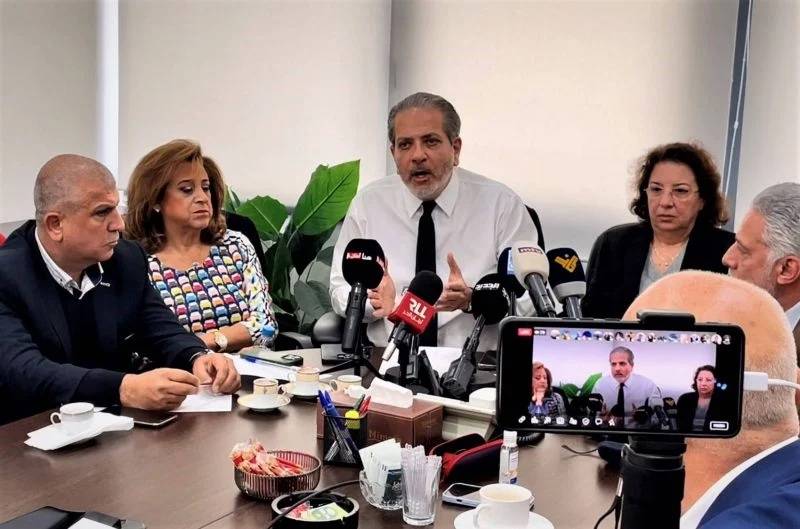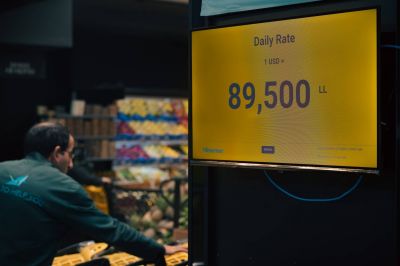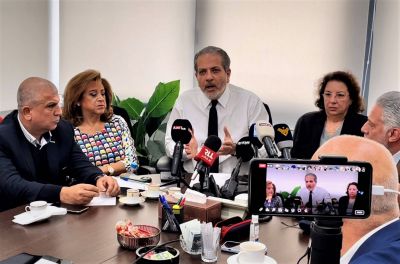
Representatives of the fuel sectors met at the headquarters of the Association of Petroleum Importing Companies. (Credit: PHB)
Professionals in Lebanon’s fuel sector called on Wednesday for a series of measures that they believe will remedy the impact on their businesses of the sharp fluctuations of the Lebanese lira against the dollar on the parallel market.
Lebanon’s national currency has lost more than 98 percent of its value since 2019, and its exchange trajectory against the US dollar has grown increasingly erratic in recent weeks. As a result, it has become typical that the Energy Ministry issues new prices in Lebanese lira twice daily for gasoline, diesel and domestic gas, and on Tuesday it updated fuel tariffs three times.
During a meeting at the headquarters of the Association of Petroleum Importing Companies, representatives of the various companies — including importers and distributors of gasoline, fuel oil and gas, as well as owners of gas stations — demanded that the Ministry of Energy and Water amend its way of setting fuel prices to be more responsive to periods during which the exchange rate changes rapidly on the market, as was the case Tuesday.
These demands were made in two parts. The industry first asked for the distribution of an application relaying the fuel prices based on how the exchange rate is evolving, even during the weekends.
According to the association’s head, Maroun Chammas, who held a press briefing after the meeting, this application is “ready” and its launch depends on the ministry’s decision. According to Chammas, this application’s operation is more transparent than the informal ones currently used, and prices will be automatically adjusted if the exchange rate changes by more than LL1,000 in an hour or more.
According to Chammas, the application was developed by the Lebanese company Tedmob in partnership with an American company; Chammas did not reveal the American company’s name.
Setting fuel pumps
For as long as this application remains unimplemented and if the minister is reluctant to change the prices every hour in the event of strong fluctuations, those gathered at the meeting said the fuel industry plans to unilaterally align its prices to the market rate.
For gas stations, this would mean setting some pumps to display prices in dollars and others to displace them in Lebanese lira in line with the official prices issued by the ministry.
“Station managers will be free to shut down gas pumps set according to the ministry’s prices in lira if they are exceeded and to only keep the others. This option will be activated only when we have exhausted all remedies to support our demands,” said Chammas.
The sector’s representatives plan to defend these demands before Energy Minister Walid Fayad, who is currently participating in the World Water Summit in New York and is set to return to Lebanon at the beginning of the week.
However, many details will have to be worked out to make either process viable, such as whether gas stations will also give change in dollars or lira, and how to avoid abuses (like forcing customers to pay in dollars or adding a margin on prices in lira), among other things.
On Tuesday, in less than 24 hours, the exchange rate on the market rose by nearly LL30,000, hitting LL142,000 before falling back to around LL110,000 following a new intervention by the central bank.
With every quick increase in the exchange rate, some distributors stop selling their goods to avoid cutting into their profit margins or even making a loss, while others decide to sell at the market rate or sell in dollars.
According to those present, caretaker Prime Minister Najib Mikati and caretaker Economy and Trade Minister Amin Salam have no objection to the fuel sector benefiting from the same arrangements as the tourism sector or, more recently, supermarkets, which are now permitted to display prices in dollars and charge their customers in lira at the market rate, or a rate close to it.
This article was originally published in French by L'Orient-Le Jour. Translation by Joelle El Khoury.

